Note: In 2020, I’m writing 52 blog posts, one per week, released on Mondays or so. Today’s simple and quick entry is for Week 24. Week 22 was my #OpDeathEaters review of the recent Investigation Discovery special focused on pedosadist Jeffrey Epstein, and Week 23 was my updating that post. Expect a longer post next week.
King County phases
On Monday 15 June 2020, King County (includes Seattle; and, the only county in the country named for Martin Luther King Jr.) applied to
the Washington state health department seeking permission to move from Phase 1.5 (aka modified Phase 1) to Phase 2, which are stages of the state government’s (un)safe start plan to re-open the overt trade economy (the economy you see in the newspaper, as opposed to covert trade in weapons drugs and humans, and as opposed to non-trade organizing of goods and services, see below). Phase 2 would mean more people out of their homes transacting business during the pandemic. According to a BizJournals.com article, the Washington state health agency could authorize the King County escalation from Phase 1.5 to Phase 2 as early as Friday 19 June 2020. Here’s King County’s 37-page application.
The application comes the same week as the University of Washington’s Institute for Health Metrics and Evaluation — a research institute once used by the White House for coronavirus projections — forecasts more than 200,000 deaths from COVID-19 in the United States by the first of October. I still think roughly three-quarters of a million or more U.S. residents will die by the end of the year from COVID-19, and (averaging things out somewhat ridiculously) every USian remaining alive on 31 Dec 2020 will know personally at least one person novel coronavirus has killed. To point out that humans are unfortunately regarded as expendable in the face of dolla dolla bill is correct and a good start, yet also incomplete. Living in a trade civilization means just about everyone almost always gets their bar soap, celtic salt, guitar strings, lube, and pretty much everything else from quid pro quos (exchange/trade). As a result, the correct yet incomplete observations about the imbalanced scales (life versus business) can seem a needless attack on those producing or consuming goods and services, that is to say, basically all of us. To help amp up the growing sense among the public that life and interactions are nevertheless more valuable than trade and transactions, requires goals (such as these and these) and inclusive, effective replacement systems to facilitate non–communist sharing planetwide. Instead of getting bogged down in debating which trade economy phase we should watch the authorities re-open upon us, we must expand/strengthen and defend the approval economy for all that for millenia we have already opened. From that approval economy for all post by Heather Marsh in 2013:
The trust networks and reputations which make up an approval economy are part of the daily life of all societies already. The people you invite to eat a dinner you have provided are typically people who have earned your trust and approval. They will usually provide similar benefits to you if they are able, and if they consistently do not they may begin to receive less invitations. We care for grandparents who are unable to reciprocate because we recognize ourselves as part of a continuum of family obligation which cared for us when we were young and will hopefully do so again when we are old. When we ask the identity of an absent group member, their reputation and approval rating is frequently implied in the answer, and sometimes we ask for referrals outright. Even as anonymous participants on some internet sites our input is ranked and voted up and down, contributing to our reputation. Sometimes our internet reputation is already used to introduce us to wider societies providing basic needs, such as couchsurfing.
Approval economies are the natural economies of human society. We separated power from societal approval and exchanged society for trade relationships so long ago most cannot imagine an alternative, but it is still there in the most basic units of society. Economies based on trade relationships with financial systems as tools of coercion and control cannot coexist with peaceful and just societies. Power will be concentrated in able bodied traders and hoarders as long as we continue using trade economies.
West Seattle Bridge
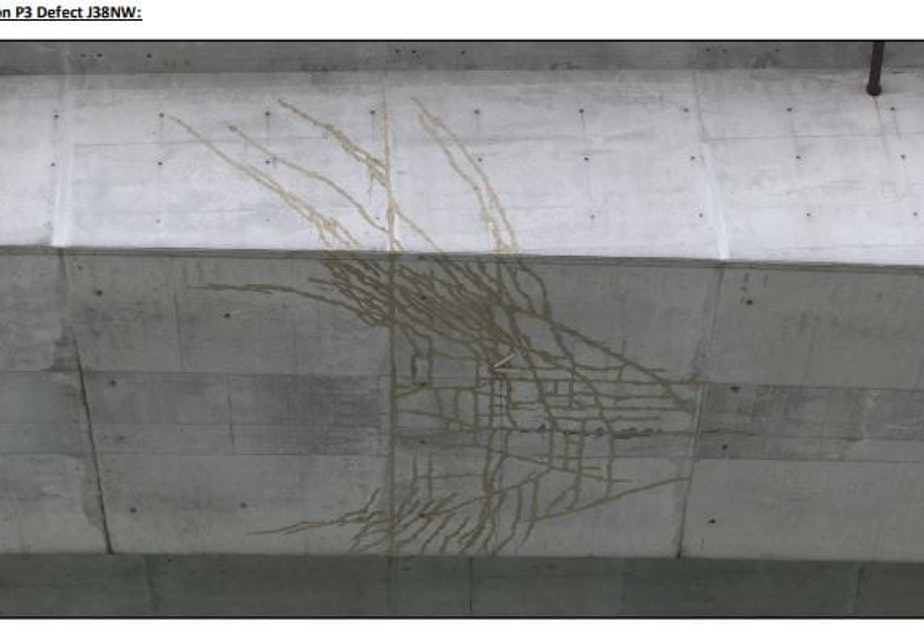
In the last year I’ve been working some as an educator teaching algebra to middle school kids. Obviously the students asked me, Math sucks will we ever need to know this in real life??? I told them, you know how Seattle has all these bridges? Well, we will need to know graphs and variables and equations to repair them someday…and already that day has arrived.
On 23 March 2020, the West Seattle Bridge, a major piece of infrastructure in this city, was suddenly closed with only a few hours of warning to the public. Well, the portion of the Bridge that spans the Duwamish River and gets you in and out of West Seattle, anyway. The Lower Spokane bridge, also known as the low bridge, right next to the West Seattle Bridge, is showing deterioration too, it was reported last week, and is currently being monitored; the low bridge is closed to regular vehicles (travel permitted only for emergency and other essential vehicles), though it might open to regular vehicles between July 12 and August 1. Around the day the West Seattle Bridge was first closed, the information coming out from the authorities strongly suggested the West Seattle Bridge would remain shut for all of 2020. They also explained the Bridge might reopen in 2021 — or never. Today we learn the Bridge at the earliest will open in 2022.
Wait, where am I getting all this information from? For all your West Seattle Bridge coverage funky needs regarding the basic facts, reported thoroughly and well, I recommend the West Seattle Blog’s tag for the West Seattle Bridge Safety Project, plus adept searching of the West Seattle Blog’s website and twitter. Furthermore, today between 1pm and 2:30pm Pacific, the West Seattle Bridge Community Task Force holds its second meeting online: join (maybe an archive will be available at that join link afterward as well?), or read the 2-page PDF agenda, or simply continue reading this post. You can find information on such upcoming meetings from the West Seattle Blog, among other sources. Check out the Seattle transportation department’s website for the West Seattle High-Rise Bridge Safety Project (including its FAQ), consider signing up for email updates from them, and if you want, see other stuffs.
The Bridge disrepair is dangerous enough that in May 2020, the Seattle transportation department snailmailed Seattle residents near it the following notice (scanned and screenshotted by me):
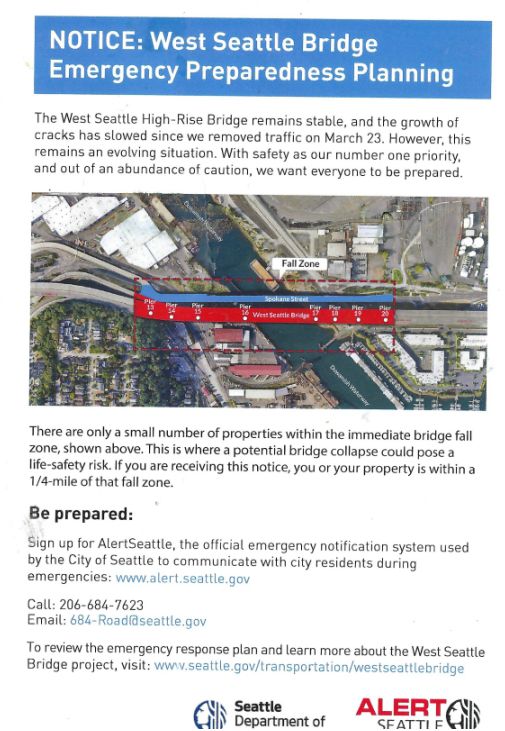
The notice says: the Bridge “remains an evolving situation […] properties within the immediate bridge fall zone […] where a potential bridge collapse could pose a life-safety risk.” Not every day that a bridge falls on our heads!
Here are some updates/notes from today’s West Seattle Bridge Community Task Force meeting. Engineers are checking the West Seattle Bridge daily. The Bridge is showing new hairline cracking every week due to its own weight and thermal stressors. As the below flowchart from today’s meeting shows (Seattle transportation department employee Matt Donahue is the lead engineer regarding the Bridge), engineers/whoever are currently trying to figure out if it’s time to repair the bridge or time to replace it. The flowchart indicates that decision should come this summer. Repairing the Bridge would mean the earliest possible opening date would be in 2022; replacing the Bridge (complete with controlled demolition!) would mean the earliest possible opening date would be somewhere between 2024 to 2026. Assuming things go as planned…
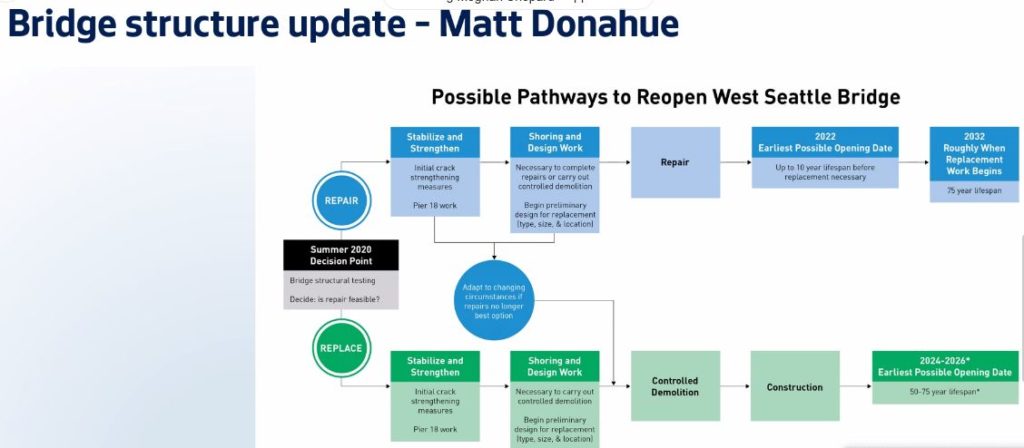
Donahue also said in today’s West Seattle Bridge Community Task Force meeting that so far, the engineers’ analysis is that the Bridge can be repaired (it’s technically possible to do so), in that those working on the Bridge haven’t yet found anything that would preclude a repair, but the main question is, should the Bridge be repaired or instead replaced. Most frighteningly, Matt Donahue said it remains possible that the Bridge will suffer a “catastrophic failure” (fall on our heads).
In light of the ongoing catastrophic failure possibility, plus the ongoing pandemic and the ongoing overt trade economy implosion, I’m still curious if auto transit across the Duwamish River will actually ever be possible again. Will the West Seattle Bridge ever really re-open? Will an everyday Seattleite like me drive across it ever again? It would be great to see solid information, rather than my intentionally provocative speculation, addressing if brain drain (skilled individuals leaving the United States for countries accessibly offering health care and other basic services) is impacting efforts to repair or replace the Bridge, or what “opportunities” other countries might be evaluating as their governments and corporations ponder the United States’ inability, in various regards, to fix itself. After failed state, does “international rebuilding” come next?
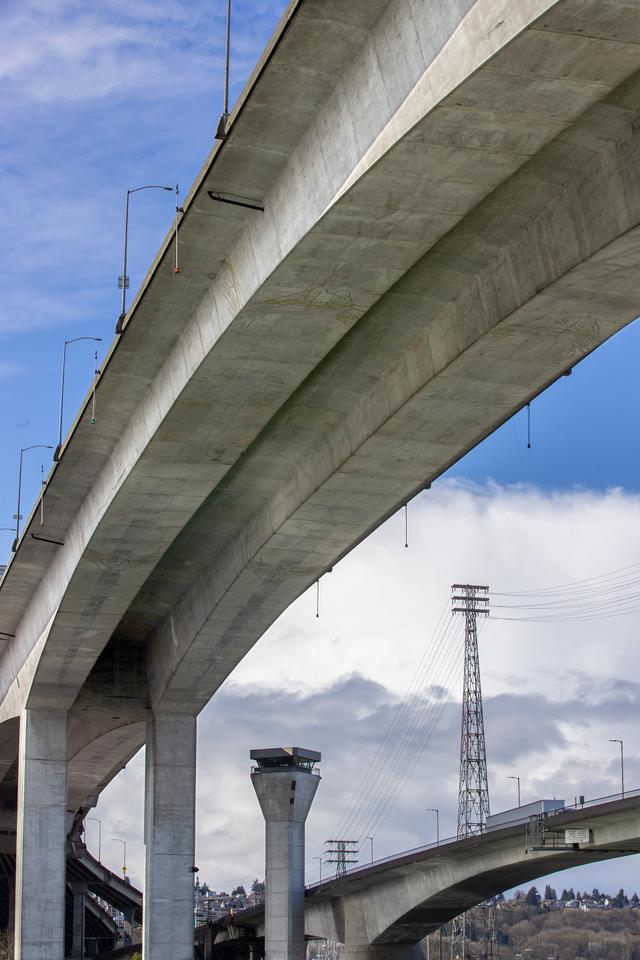
As always, what we aim to do with our economies plural, or with the cracking West Seattle Bridge, is up to us. To widen our perspectives/paradigms and to force-multiply our capabilities for self-governance, I especially encourage readers to check out these two posts by Heather Marsh and her books, and to follow these Twitter accounts: @YourAnonCentral, @OpDeathEaters, @OpDeathEatersUS. There’s also me, @DouglasLucas on Twitter as well as this blog, my email (DAL@RISEUP.NET), etc. Thanks!


This blog post, Quick Seattle news: King County phases and West Seattle Bridge, by Douglas Lucas, is licensed under a Creative Commons Attribution-NonCommercial-ShareAlike 4.0 International License (human-readable summary of license). The license is based on a work at this URL: https://douglaslucas.com/blog/2020/06/17/king-county-phases-west-seattle-bridge/ You can view the full license (the legal code aka the legalese) here. For learning more about Creative Commons, I suggest this article and the Creative Commons Frequently Asked Questions. Seeking permissions beyond the scope of this license, or want to correspond with me about this post otherwise? Please email me: dal@riseup.net.
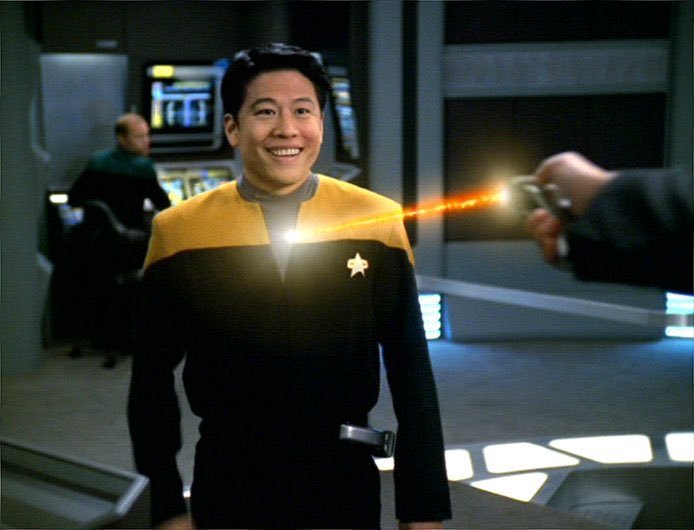
 Twitter:
Twitter:
Join the conversation